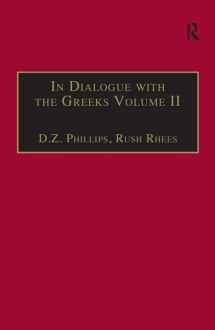
In Dialogue with the Greeks: Volume II: Plato and Dialectic (Ashgate Wittgensteinian Studies)
ISBN-13:
9780754639893
ISBN-10:
0754639894
Edition:
1
Author:
Rush Rhees, D. Z. Phillips
Publication date:
2004
Publisher:
Routledge
Format:
Hardcover
304 pages
FREE US shipping
Book details
ISBN-13:
9780754639893
ISBN-10:
0754639894
Edition:
1
Author:
Rush Rhees, D. Z. Phillips
Publication date:
2004
Publisher:
Routledge
Format:
Hardcover
304 pages
Summary
In Dialogue with the Greeks: Volume II: Plato and Dialectic (Ashgate Wittgensteinian Studies) (ISBN-13: 9780754639893 and ISBN-10: 0754639894), written by authors
Rush Rhees, D. Z. Phillips, was published by Routledge in 2004.
With an overall rating of 3.6 stars, it's a notable title among other
books. You can easily purchase or rent In Dialogue with the Greeks: Volume II: Plato and Dialectic (Ashgate Wittgensteinian Studies) (Hardcover) from BooksRun,
along with many other new and used
books
and textbooks.
And, if you're looking to sell your copy, our current buyback offer is $0.3.
Description
This second of two volumes on the Greeks by Rush Rhees takes up the questions bequeathed by the previous volume. If reality does not have the unity of a thing, can it have any kind of unity at all? The alternative seems to be that reality has the unity of a form. In this volume Rhees brings the perspective of a modern Wittgensteinian philosopher to bear on the dialogues of Plato. In his treatment of the Georgias and the Symposium Rhees emphasizes Socrates' claim that it is important to seek understanding although one cannot say, in the form of a theory or philosophical thesis, what that understanding amounts to. In considering the Phaedo, Theaetetus, Parmenides and Timaeus, Rhees pursues these questions in a way which relates them to live issues concerning the relation between logic and discourse. Rhees shows that Plato's Forms can neither be thought of by analogy with 'ultimate' particles in physics, nor as fixed concepts that determine what can and cannot be said. Finally, D. Z. Phillips includes two treatments by Rhees of the Republic separated by fifteen years. In the first he criticises Plato for a fixed view that an order predetermines and makes possible growth in understanding, showing how this is the very antithesis of growth. In the second he returns to the tension in Plato's thought between 'answerability to reality' and the view that understanding and growth can only be achieved through a seeking in dialogue. Rhees concludes that language is not a collection of isolated games, rather we speak in the course of lives that we lead and what we say has its meaning from the place it occupies in the course of a life.


We would LOVE it if you could help us and other readers by reviewing the book
Book review

Congratulations! We have received your book review.
{user}
{createdAt}
by {truncated_author}


